MAC unveils 2024 legislative priorities
 A commitment to the financial health of Michigan counties undergirds a robust legislative agenda released today by the Michigan Association of Counties for 2024.
A commitment to the financial health of Michigan counties undergirds a robust legislative agenda released today by the Michigan Association of Counties for 2024.
Among the priorities for MAC in Lansing this year are revenue sharing, state reimbursement for lost revenue due to the disabled veteran property tax exemption, extending the sunset on our ability to collect fees that fund our trial courts, tackling the issue of Medicaid for jail inmates set to be released and ongoing challenges in financing infrastructure improvements and maintenance.
Revenue Sharing Trust Fund
MAC places a high priority on securing and enhancing the revenue sharing for counties. House Bills 4274-75 carve out a portion of the state sales tax and dedicates it to revenue sharing passed the House last November with overwhelming bipartisan support. Getting this policy through the Senate and to the governor’s desk tops the list of our priorities this year.
Disabled Veterans Property Tax Exemption reimbursement
Since 2014, MAC has been seeking reimbursement for the state policy exempting 100 percent disabled veterans from paying property taxes. When the policy was initially passed, the cost estimate for locals was in the ballpark of $18 million. Today, the cost is closer to $100 million for all recipients of property tax revenue. Working with the veterans organizations and policy-makers, we have come up with a mechanism to reimburse local units for their lost revenue. Unfortunately, the state is more than hesitant to take financial responsibility for the exemption. MAC will continue to work with the administration to stress the importance of the reimbursement to counties.
Increasing resources for juvenile justice services
MAC recognizes the need for additional beds for juveniles across the state and the challenges counties face with a lack of available and qualified workers to staff these facilities. The only way to address these critical shortages is to infuse additional funds into the system. MAC will seek state funds for staff recruitment, retention and training, plus direct funding for facilities.
Extending the sunset on trial court funding authorization
To maintain the effectiveness of the judicial system, MAC calls for an extension of the sunset on trial court funding authorization. The current authorization for the collection of fees that help to fund our trial courts expires in May. We will seek an extension of this authorization to May of 2026 and in the interim seek the enactment of the recommendations from the Trial Court Funding Commission.
Medicaid Inmate Exclusion Policy
While federal legislation to address necessary reforms to the Medicaid Inmate Exclusion Policy (MIEP) is under way, and several states have been approved for Medicaid Section 1115 waivers to allow for Medicaid coverage for incarcerated individuals, Michigan counties still face burdensome costs in anticipation of these reforms.
To alleviate the financial burden imposed by the MIEP, MAC is pursuing a policy to require health care providers to bill at the Medicaid-established rate for all incarcerated individuals who do not possess private health care and receive medical care outside of the county jail. In addition, MAC is working on an initiative to require the Michigan Department of Health and Human Services to apply for a Medicaid Section 1115 Re-entry Waiver, which several other states have been approved for, to reinstate Medicaid benefits for incarcerated individuals prior to release from county jails.
Infrastructure funding
Addressing Michigan’s infrastructure needs, MAC prioritizes road funding in its legislative agenda. Proposals include sustainable and long-term solutions to maintain and improve the state’s transportation infrastructure. With declining gas tax revenue due to more efficient vehicles and the influx of electric vehicles and road quality declining, a new approach must be found. MAC envisions safer roads, reduced congestion and enhanced connectivity contributing to economic growth and overall community well-being.
For more information on MAC’s 2024 priorities, please contact Deena Bosworth at bosworth@micounties.org.
Experts: $14 billion to spend from state General Fund in fiscal 2025
 Michigan legislators will have about $14 billion in General Fund revenue to use for the fiscal 2025 budget, economic and budget experts said Friday in the first Consensus Revenue Estimating Conference (CREC) of 2024.
Michigan legislators will have about $14 billion in General Fund revenue to use for the fiscal 2025 budget, economic and budget experts said Friday in the first Consensus Revenue Estimating Conference (CREC) of 2024.
These conferences are required by statute to determine the state of Michigan’s financial resources as lawmakers draft annual budgets, including spending areas that are critical to county needs, such as revenue sharing.
As for impacts on county priorities in 2024, MAC Governmental Affairs Director Deena Bosworth said the projections leave the potential for MAC’s goal to enact a dedicated Revenue Sharing Trust Fund this year in good shape. but the meager growth does hinder the possibility for investment in other MAC priorities.
As for the perennial question of infrastructure funding, Bosworth said the clear need there is for the state to develop a new method to fund road maintenance and improvements in the face of pressures on traditional fuel taxes.
The Legislature will begin its budget work in earnest in February when Gov. Gretchen Whitmer presents her Executive Budget recommendations. The next revenue conference, in May 2024, will set the final numbers available for spending for the FY25 state budget, which is supposed to be finished, by statute, by June 30.
For more information on MAC’s budget advocacy, contact Deena Bosworth at bosworth@micounties.org.
‘Ax Tax’ proposal headed back to the Board of State Canvassers next week
 Earlier this week, MAC, in a special Podcast 83 episode to launch its 2024 season, reviewed a radical ballot proposal that, if adopted, would blow a nearly $3 billion hole in county revenues.
Earlier this week, MAC, in a special Podcast 83 episode to launch its 2024 season, reviewed a radical ballot proposal that, if adopted, would blow a nearly $3 billion hole in county revenues.
The podcast guest, Steve Liedel of the firm of Dykema in Lansing, is an expert in elections law, discussed the process that the group “Ax MI Tax” is using to try to ban property taxes in Michigan.
Since the taping and release of this episode, the Ax MI Tax group has altered their course and is again going before the Board of State Canvassers to have their ballot proposal summary language approved before they start the signature collecting process. The meeting to approve the language is set for Jan. 19.
MAC is part of a group of interested parties engaging and closely monitoring this proposal and will keep our membership updated as we learn more.
For more information on this issue, please contact Deena Bosworth at bosworth@micounties.org.
Ballot group formed to challenge energy siting law
 A ballot committee announced its plan last week to bring a voter initiative on a new law to revamp legislation that grants the Michigan Public Service Commission (MPSC) the ability to override local governments in the permitting of renewable energy facilities.
A ballot committee announced its plan last week to bring a voter initiative on a new law to revamp legislation that grants the Michigan Public Service Commission (MPSC) the ability to override local governments in the permitting of renewable energy facilities.
Citizens for Local Choice is behind the proposal and aims to gather 550,000 signatures before May to get the initiative on the ballot for the November 2024 election. The group hopes to raise $7 million to $10 million to fund their work. (Under Michigan’s “indirect” initiative process, the measure would first go to the Legislature, which could choose to adopt it. If the Legislature rejected the initiative, the question would then move to the voters.)
The intent of the initiative is to nullify part of Public Act 233 of 2023, which allows solar and wind developers to apply for a permit directly to the MPSC if the local unit has not adopted a Compatible Renewable Energy Ordinance. If the local unit has such an ordinance, the developer may eventually appeal adverse decisions to the MPSC. Ultimately, the ballot initiative is an attempt to retain full local zoning authority.
According to Ballotpedia, the 2024 signature requirement for an initiated law is 356,958.
MAC was opposed to the act’s provisions that stripped decision-making from local governments, but that is not an indication of our position on clean energy goals. MAC is not a member of Citizens for Local Choice and has not been involved in the group’s work.
MAC-backed coalition will recognize promising practices on opioids
 The Opioid Advisory Commission (OAC) is partnering with the Michigan Association of Counties, Michigan Municipal League and Michigan Townships Association, to spotlight local governments that are demonstrating promising practices, in alignment with national guidance.
The Opioid Advisory Commission (OAC) is partnering with the Michigan Association of Counties, Michigan Municipal League and Michigan Townships Association, to spotlight local governments that are demonstrating promising practices, in alignment with national guidance.
Individuals can nominate their local government for recognition by the OAC, within quarterly and annual reports of the Commission —completion of this form allows for nomination of a jurisdiction.
Click here to nominate your local government.
Through nomination, the work of local governments may also be shared with the National Association of Counties (NACo.) Opioid Solutions Center for recognition on their website or within publications, and Johns Hopkins Bloomberg School of Public Health as nomination for Awards for Excellence in the Application of the Opioid Litigation Principles.
Data collected from this survey will be housed with the OAC and shared with the Michigan Association of Counties, Michigan Townships Association, and Michigan Municipal League.
For more information, contact oac@legislature.mi.gov.
Learn about $6 million ‘Catalyst Communities’ grant opportunity on Jan. 26
 The Catalyst Communities Initiative is a comprehensive program to provide education, training, planning, and technical resources to local governments as they work toward their sustainability goals. This initiative offers an array of resources on various environmental, social, and economic topics to help communities across Michigan make a just transition to decarbonization and meet our MI Healthy Climate Plan goals. The initiative aims to provide a range of resource options to meet communities wherever they are, regardless of geography, population size, or pre-existing knowledge. The Michigan Department of Environment, Great Lakes, and Energy (EGLE), Catalyst Communities Initiative is hosting this webinar series free to communities.
The Catalyst Communities Initiative is a comprehensive program to provide education, training, planning, and technical resources to local governments as they work toward their sustainability goals. This initiative offers an array of resources on various environmental, social, and economic topics to help communities across Michigan make a just transition to decarbonization and meet our MI Healthy Climate Plan goals. The initiative aims to provide a range of resource options to meet communities wherever they are, regardless of geography, population size, or pre-existing knowledge. The Michigan Department of Environment, Great Lakes, and Energy (EGLE), Catalyst Communities Initiative is hosting this webinar series free to communities.
Next event: Jan. 26, 11 a.m. to noon (Eastern) – Community Energy Management Program RFP and Application Overview
The Community Energy Management Program has been amended to expand the total amount of funding available, eligible projects areas, and the maximum award size. These changes were made possible by additional federal funding from the State Energy Program’s (SEP) Bipartisan Infrastructure Law allocation and the Department of Energy’s Energy Efficiency and Conservation Block Grant (EECBG) allocation. This webinar will highlight the additional funding and increased award sizes that are available, along with the expanded eligible project areas that communities can consider when applying.
Noteworthy details:
- Program solicitation closes June 30, 2024, or when all funding is expended, whichever comes first.
- Total funding available is $5,850,000.
- Project awards have been expanded to a minimum of $5,000 and a maximum of $100,000.
- For the SEP portion of the funds, any local government, tribal government, or other public service entity physically located in Michigan is eligible to apply.
- For the EECBG portion of the funds, any local government or tribal government physically located in Michigan that did not receive direct EECBG funding allocations is eligible to apply.
- The grant period will end, and funds must be expended by Aug. 31, 2025.
Webinar recordings are posted online for future viewing on the Catalyst Communities Webinars Webpage and anyone registering to join will get a notification when the recording is available.
MAC’s YouTube page has dozens of new videos
 The Michigan Association of Counties holds numerous educational events each year to help members stay abreast of policy and financial developments. And, for those members who are unable to attend, either in person or via digital links, MAC routinely records presentations and makes them available through our channel on YouTube.
The Michigan Association of Counties holds numerous educational events each year to help members stay abreast of policy and financial developments. And, for those members who are unable to attend, either in person or via digital links, MAC routinely records presentations and makes them available through our channel on YouTube.
Be sure to bookmark our YouTube page to see all of MAC’s video work.
Recent additions to the channel include:
- Content from MAC’s 2023 Policy Summit, held on Dec. 7, 2023
- Newest episodes of Podcast 83, MAC’s podcast about all things related to county government in Michigan
- Content from the 2023 Michigan Counties Annual Conference, held Oct. 1-3, 2023, in Kalamazoo
Be sure to bookmark the page on your browser, as we will add videos throughout the year.
MAC offices closed for MLK holiday
 MAC’s offices in Lansing will be closed on Monday, Jan. 15 to observe the Dr. Martin Luther King, Jr. Holiday.
MAC’s offices in Lansing will be closed on Monday, Jan. 15 to observe the Dr. Martin Luther King, Jr. Holiday.
Normal office hours will resume at 8 a.m. on Tuesday, Jan. 16.
For information on MAC committee meetings, click here. For information on MAC events, click here.
Nominations open for Hometown Health Hero awards
 The Michigan Public Health Week Partnership, a collaboration of 12 organizations, including MAC, working to increase the visibility of significant accomplishments in public health, is seeking nominations of individuals and organizations that have made significant contributions to preserve and improve their community’s health for its annual Hometown Health Hero awards. Hometown Health Hero awards are presented every spring as part of Michigan Public Health Week, April 8-14. Award recipients will be honored at a reception April 10 in the atrium of Heritage Hall in the State Capitol.
The Michigan Public Health Week Partnership, a collaboration of 12 organizations, including MAC, working to increase the visibility of significant accomplishments in public health, is seeking nominations of individuals and organizations that have made significant contributions to preserve and improve their community’s health for its annual Hometown Health Hero awards. Hometown Health Hero awards are presented every spring as part of Michigan Public Health Week, April 8-14. Award recipients will be honored at a reception April 10 in the atrium of Heritage Hall in the State Capitol.
Michigan Public Health Week is observed as part of National Public Health Week the first week of April to recognize the contributions of public health and to highlight issues that are important to improving the nation’s health. Each year, the American Public Health Association develops a campaign to educate the public, policy makers and health care providers about issues related to that year’s theme.
Nomination forms can be downloaded from Michigan.gov/mphw. Completed nominations should be sent to Jim Koval via email at kovalj@michigan.gov or faxed to 517-335-8392 by Wednesday, Jan. 31.
 Staff picks
Staff picks
- Macomb County juvenile court officials plan to expand programing for offending youths (Macomb Daily)
- The oldest counties in Michigan (map) (MLive)
- Fiscal Snapshot: State Parks (Michigan House Fiscal Agency)
- How to break up with your bad habits (Harvard Business Review)
Federal court orders new lines for set of legislative districts
 Some of Michigan’s House and Senate election districts face a revamp in wake of a Thursday afternoon ruling by a federal court on a challenge that the existing maps unconstitutionally handled African-American voters.
Some of Michigan’s House and Senate election districts face a revamp in wake of a Thursday afternoon ruling by a federal court on a challenge that the existing maps unconstitutionally handled African-American voters.
The state’s Independent Redistricting Commission, which drew the maps and which was created via a ballot proposal in the 2018 elections, said in a statement it was “aware and disappointed” in the ruling that targets 13 House and Senate districts.
The commission has until Jan. 2 to submit a brief to the court on how it thinks the redrawing process should be done for the 2024 House elections.
The Michigan House is currently split 54-54 between Democrats and Republicans, following the resignation of two Democratic members who won mayorships in November. Special elections to refill those seats are set for April.
On social media Thursday evening, Steven C. Liedel, an attorney for the Dykema law firm wrote, “Even if (the) Independent Redistricting Commission were to redraw maps that affect other districts, the new House districts would be effective for the November 2024 election, not the special elections.
“No Senate elections until 2026,” he added.
The districts in question are:
- House District 1, currently represented by state Rep. Tyrone Carter, D-Detroit.
- House District 7, currently represented by state Rep. Helena Scott, D-Detroit.
- House District 8, currently represented by state Rep. Mike McFall, D-Hazel Park.
- House District 10, currently represented by state Rep. Joe Tate, D-Detroit.
- House District 11, currently represented by state Rep. Veronica Paiz, D-Harper Woods.
- House District 12, currently represented by state Rep. Kimberly Edwards, D-Eastpointe.
- House District 14, currently represented by state Rep. Donavan McKinney, D-Detroit.
- Senate District 1, currently represented by state Sen. Erika Geiss, D-Detroit.
- Senate District 3, currently represented by state Sen. Stephanie Chang, D-Detroit.
- Senate District 6, currently represented by state Sen. Mary Cavanagh, D-Redford Township.
- Senate District 8, currently represented by state Sen. Mallory McMorrow, D-Royal Oak.
- Senate District 10, currently represented by state Sen. Paul Wojno, D-Warren.
- Senate District 11, currently represented by state Sen. Veronica Klinefelt, D-Eastpointe.
MAC will closely monitor the situation and brief members on how it might affect county legislative priorities in 2024 and beyond, said Director of Governmental Affairs Deena Bosworth.
 MAC scores wins in short, but busy, year in Lansing
MAC scores wins in short, but busy, year in Lansing
In a year abbreviated by an early adjournment of the Michigan Legislature, MAC and its 83 members still scored several policy victories in Lansing, highlighted by the adoption of a long-overdue reform of juvenile justice law and progress on a dedicated Revenue Sharing Trust Fund.
To see a complete summary of MAC’s work on key county issues at the State Capitol, click the image or here. (The summary is organized alphabetically by issue area.)
For questions on MAC’s advocacy work, contact Director of Governmental Affairs Deena Bosworth at bosworth@micounties.org.
Podcast 83 team reacts to report of governor’s population council
 A sweeping, yet vague, set of recommendations by a state panel is the subject of the newest episode of MAC’s Podcast 83 this week.
A sweeping, yet vague, set of recommendations by a state panel is the subject of the newest episode of MAC’s Podcast 83 this week.
Host Stephan Currie and MAC Governmental Affairs Team of Deena Bosworth, Samantha Gibson and Madeline Fata give some quick takes on the report of the Growing Michigan Together Council, which was formed by Gov. Gretchen Whitmer earlier in the year to address Michigan’s demographic challenges.
Responding to a question by Currie about the role and history of state task forces in Michigan, Bosworth noted, “(Task forces highlight) the need for focusing on policy in specific areas.” She added, however, that in the “vast majority of them, we don’t get a whole lot of action items.”
As always, the question of money is central to the discussion, team members noted.
“It’s billions of dollars … to implement all of these recommendations in there,” Bosworth said, adding that the report “really doesn’t say ‘raise revenue here to put it there.’”
“I don’t know how hard it hits on what we do about (attracting and keeping young people), beyond throwing money at the problem,” argued Gibson.
“It was great to put all this information together,” Bosworth said. “The major theme is that we have stopped investing in our state.
“We are 25 percent below the revenue we were collecting in our state General Fund from 2000. How are we going to fund all of our infrastructure if we are not collecting that much revenue?”
Council documents include:
- Full council report (86 pages)
- Executive summary (6 pages)
View the full video of the episode, recorded Dec. 19, 2023, by clicking here.
Previous episodes can be seen at MAC’s YouTube Channel.
And you always can find details about Podcast 83 on the MAC website.
MAC sets office hours for holiday break
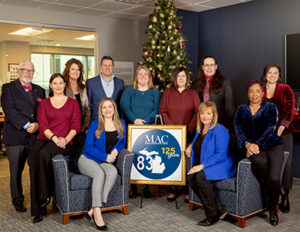 MAC’s Lansing offices will be closed on the following dates to observe holidays:
MAC’s Lansing offices will be closed on the following dates to observe holidays:
Friday, Dec. 22: Closing at noon for staff event.
- Monday, Dec. 25: Closed.
- Tuesday, Dec. 26: Closed.
- Friday, Dec. 29: Closed.
- Monday, Jan. 1: Closed.
If you have any questions or service requests between now and Jan. 2, please call 517-372-5374.
 Legislative Update taking holiday hiatus
Legislative Update taking holiday hiatus
Today is the last edition of MAC’s “Legislative Update” for calendar 2023.
To see any 2023 edition of Legislative Update, visit the News section of MAC’s website.
Normal posting of the email will resume on Friday, Jan. 12.
Apply for the 2024 NACo Achievement Awards
 Since 1970, the NACo Achievement Awards have recognized outstanding county government programs and services. Through a non-competitive application process, noteworthy programs receive awards in 18 categories that cover a vast range of county responsibilities.
Since 1970, the NACo Achievement Awards have recognized outstanding county government programs and services. Through a non-competitive application process, noteworthy programs receive awards in 18 categories that cover a vast range of county responsibilities.
In 2023, five Michigan counties received NACo awards.
If you are ready to begin your application, click here to access the application portal. In addition, you can use the portal to view, edit and submit previously saved applications.
Only county governments and state associations of counties are eligible to submit applications. There is no limit to the number of applications that can be submitted by a single county. Regional partners are welcome to submit applications for a collective project; however, the associated county or state association must submit the application on the group’s behalf.
For more information on the program, click here.
 Staff picks
Staff picks
- Michigan’s natural resource economy is threatened by invasive trees and shrubs (Citizens Research Council of Michigan)
- Column: How the retail lobby sold a $45-billion whopper about organized shoplifting (Los Angeles Times)
- State Budget Overview (Senate Fiscal Agency)
- 2023 State of the Great Lakes Report (Michigan Department of Environment, Great Lakes and Energy)
Juvenile justice package adopted as MAC scores win in 2023 priority
 Nineteen pieces of a 20-bill package to make sweeping reforms to the juvenile justice system, long backed by MAC, was signed into law by Lt. Gov. Garlin Gilchrist this week.
Nineteen pieces of a 20-bill package to make sweeping reforms to the juvenile justice system, long backed by MAC, was signed into law by Lt. Gov. Garlin Gilchrist this week.
House Bills 4624-43 and Senate Bills 418-423, 424, 425, 426, 427, 428-429, 430-431 and 432-437 are a result of the Michigan Task Force on Juvenile Justice Reform’s recommendations provided in July 2022.
One bill, HB 4630, did not advance out of the Legislature.
The Task Force on Juvenile Justice Reform was established in 2021 and tasked with assessing Michigan’s juvenile justice data and identifying ways to improve the system. Two county commissioners served on the Task Force, each nominated by MAC. Alisha Bell of Wayne represented a county with a population over 100,000, and Marlene Webster of Shiawassee represented a county of under 100,000 in population. Rep. Sarah Lightner, R-Jackson and a former county commissioner, also served on the panel.
The task force discovered several challenges to strengthening public safety and improving outcomes for youth. This led to the set of 32 recommendations provided to the Legislature last year. The recommendations would improve community safety, reduce disparities and improve youth outcomes.
SB 418, by Sen. Sylvia Santana (D-Wayne), enhances the County Child Care Fund (CCF) by establishing a minimum framework of juvenile justice best practices statewide, including the use of risk screening and assessment tools. The best practices will be supported by an increase in the reimbursement rate for community-based services from 50 percent to 75 percent, including 17-year-olds. These changes are essential to ensuring counties have the resources to implement and utilize these approaches. The reimbursement rate for residential services will be 50 percent, including the 17-year-old population.
SBs 419–423 and HBs 4625-29 require the consistent use of validated screening and assessment tools to enable more objective decision-making and allow agencies to better match youth to appropriate supervision and services, reducing their likelihood to recidivate. The bills also expand the Diversion Act so that all offenses, with an exception for youth committing a specified juvenile violation, are eligible for pre-court diversion, based on the use of a risk-screening tool and other factors, and limit the time that a youth can be placed on pre-court diversion, unless the court determines that a longer period is needed. While diversion eligibility would be expanded, judicial discretion remains.
HB 4630, by Rep. Lightner, would have expanded the Michigan Indigent Defense Commission to include development, oversight and compliance with youth defense standards in local county defense systems. It never received a vote in the Senate. It remains to be seen if the Legislature will revisit this bill in 2024.
Enacted bills will take effect Oct. 1, 2024.
MAC supported this package as a 2023 priority.
For more information on this issue, contact Samantha Gibson at gibson@micounties.org.
Growing Michigan Council sets goals – but specifics lacking as to funding
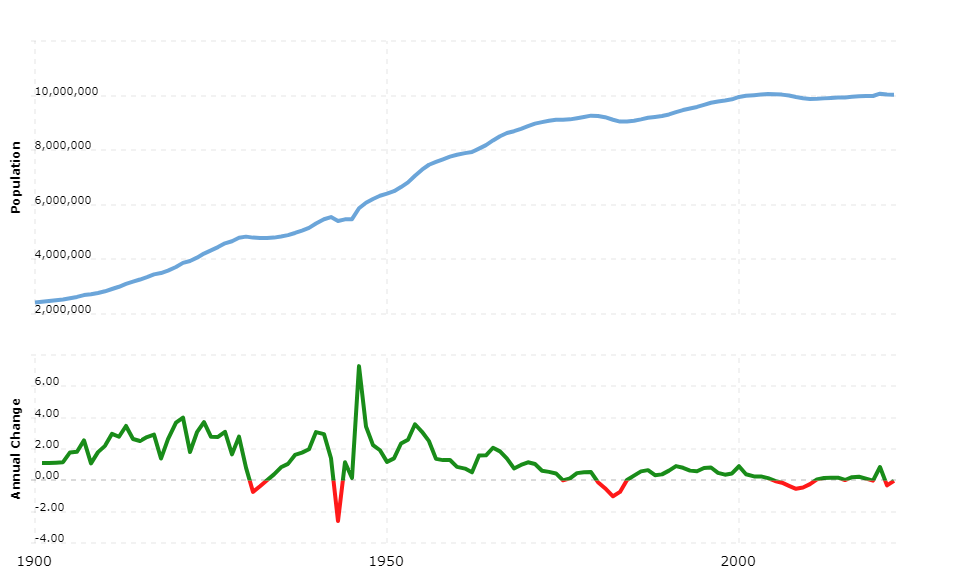
Michigan’s population has hovered around the 10 million mark for decades while other states have seen significant increases. (Source: Macrotrends.net)
The Growing Michigan Together Council, a special task force formed by Gov. Gretchen Whitmer that was notably lacking in local government representation, released a report this week for new state investments in human capital.
In its report, the council describes the hard truth facing Michigan, which is now ranked 49th out of 50 states in population growth, has seen its median income, fall, its population age and its infrastructure investments lag.
The report is light on blame for this decline but instead makes it a collective problem that we will have to face and change together:
- Full council report (86 pages)
- Executive summary (6 pages)
To counter these trends, the panel sets out three main components and subsequent recommendations, include establishing Michigan as an innovation hub, the creation of lifelong learning focused on future readiness skills and competencies and on creating thriving, resilient communities that are magnets for young talent.
Following the actionable items in the report are recommendations on ensuring momentum and taking a hard look at state policies and their funding models and an honest look at the return on investment for the state’s 10 million residents.
MAC’s Podcast 83 team will have its reactions to the council report in an episode scheduled for release on Wednesday, Dec. 20.
For more information or to provide thoughts and feedback on the report, contact Deena Bosworth at bosworth@micounties.org.
Presentations from 2023 Policy Summit
State launches online tool for FOIA requests
 A new online tool for Freedom of Information Act (FOIA) searches was unveiled this week by Secretary of State Jocelyn Benson.
A new online tool for Freedom of Information Act (FOIA) searches was unveiled this week by Secretary of State Jocelyn Benson.
The new service will allow documents to be made publicly available online as part of a FOIA request. Rather than fulfilling multiple requests, the document will be accessible online to any interested party for one year.
Changes to the way the Department of State responds to FOIA requests come after an influx of requests for election materials in recent years. This system will make the process easier for both the requestor and the team fulfilling requests behind the scenes. Online payment will be accepted for the first time, adding another level of convenience.
It is possible other agencies will follow suit should this program prove successful.
For more information on MAC’s advocacy work on FOIA issues, contact Madeline Fata at fata@micounties.org.
Medication aide legislation signed into law
 A package to create medication aide registration and permits, supported by the Michigan County Medical Care Facilities Council (MCMCFC), has been signed by Gov. Gretchen Whitmer.
A package to create medication aide registration and permits, supported by the Michigan County Medical Care Facilities Council (MCMCFC), has been signed by Gov. Gretchen Whitmer.
House Bills 4885 and 4923, by Reps. Donovan McKinney (D-Wayne) and Joseph Aragona (R-Macomb), respectively, allows for the training and registration of medication aides in a manner similar to registration and training for nurse aides, commonly referred to as certified nurse aides, or CNAs.
The changes will address staffing shortages within county medical care facilities; likely increase retention and recruitment for nurses, nurse aides and medication aides; and reduce overall errors by freeing up nurses within facilities.
For more information on this issue, contact Samantha Gibson at gibson@micounties.org.
Podcast 83 reviews MAC opioid settlement services
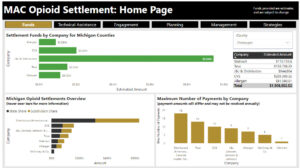 A special episode of Podcast 83 features MAC’s opioid settlement services to member counties.
A special episode of Podcast 83 features MAC’s opioid settlement services to member counties.
Host Stephan Currie interviews Amy Dolinky, MAC’s technical adviser for settlement services, about her work with dozens of Michigan counties and what questions and issues have arisen in her statewide travels.
“I’m engaged with 60 counties providing various levels of support,” explained Dolinky, who joined MAC about a year ago to work specifically with members on the complicated task of best deploying national opioid settlement dollars in their communities.
Dolinky explained she has been involved in everything from helping counties plan for creation of an advisory panel, all the way to helping folks think through what transparency looks like with their spending decisions.
“And (MAC has been) working with some counties on strategic planning efforts,” she noted.
During the discussion, Currie and Dolinky reviewed the payment timeline, with Dolinky noting that while each company has a set number of payments, they are not being issued on a standard fiscal year or annual basis — and amounts can differ from year to year.
County members with any questions about opioid settlements are encouraged to review MAC’s extensive resources on the web and/or contact Dolinky directly at dolinky@micounties.org.
View the full video of the episode, recorded in November 2023, by clicking here.
Previous episodes can be seen at MAC’s YouTube Channel.
And you always can find details about Podcast 83 on the MAC website.
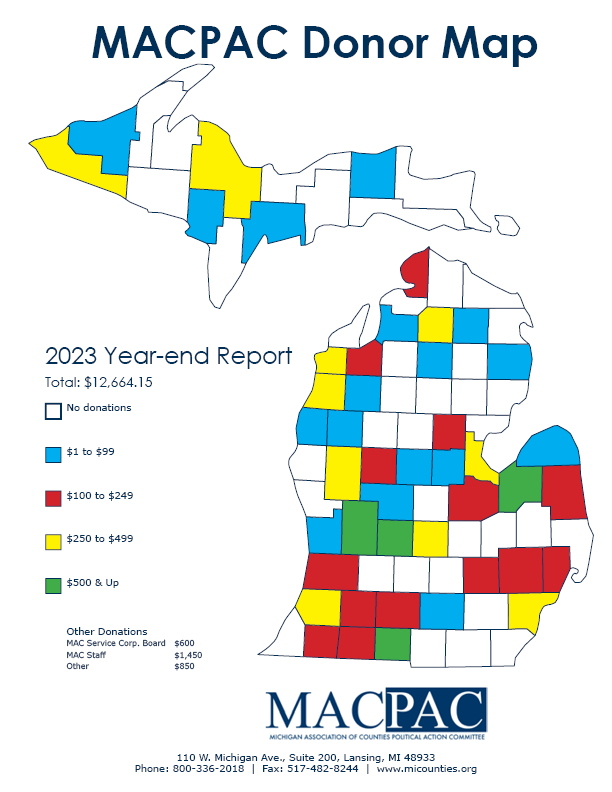
MACPAC nearly reaches $13,000 mark in 2023
Continuing its rebound from pandemic-year lows, the MAC Political Action Committee raised nearly $13,000 for a 12-month period ending on Dec. 4, 2023.
MACPAC, the only PAC in Michigan committed to supporting sitting legislators who have proven themselves to be allies of effective and efficient county government, received $12,664.15 for the year. It was backed by 80 individual donors, with donations coming from 45 of the 83 counties.
In his first months in office, Board President Jim Storey of Allegan County has spoken often about the important role MACPAC plays in MAC’s overall advocacy efforts, including at last week’s 2023 Policy Summit: “(W)hen you combine our PAC with our individual voice in our home communities, we are very strong, we are very effective.”
To learn more about MACPAC’s work or make a click online donation, click here.
Treasury seeks public comment on accounting documents
 The Michigan Department of Treasury provides direction to local governments on accounting and auditing in the form of Numbered Letters and Michigan Committee on Governmental Accounting and Auditing (MCGAA) Statements. To ensure this information is up to date and useful for its trusted partners, Treasury has begun the process of removing and updating the Numbered Letters and MCGAA statements from 1993 to the present.
The Michigan Department of Treasury provides direction to local governments on accounting and auditing in the form of Numbered Letters and Michigan Committee on Governmental Accounting and Auditing (MCGAA) Statements. To ensure this information is up to date and useful for its trusted partners, Treasury has begun the process of removing and updating the Numbered Letters and MCGAA statements from 1993 to the present.
Its ongoing goal will be to update Numbered Letters and MCGAA Statements every five years to make sure they are maintained adequately, with a focus on updating 20 percent a year. Most of the updates made will be to bring all these publications to our most current format and ensure all weblinks within those resources are accurate. Many will need to be revised more substantially or even removed from being active.
In addition to the content updates, Treasury is changing the MCGAA Statements to Numbered Letters. For this release, there will be four MCGAA Statements that will be changed to Numbered Letters. The revisions include updating to our current format and ensuring all weblinks are accurate.
The Local Audit and Finance Division is currently soliciting public comment on selected Numbered Letters and MCGAA Statements (which have been changed to Numbered Letters). Any individual or organization that would like to submit comments should provide those comments in writing by Jan. 12, 2024.
You can find the selected Numbered Letters Exposure Drafts and Numbered Letters for Public Comment below:
Comments may be submitted by email to LAFD_Audits@michigan.gov with the subject line entitled, “Numbered Letters Exposure Draft.”
Alternatively, responses may also be submitted via U.S Postal Service to:
Michigan Department of Treasury
Local Audit and Finance Division
PO Box 30728
Lansing, MI 48909-8228
If you have any questions, contact Treasury at 517-335-7469.
 Staff picks
Staff picks
- Meeting Michigan’s renewable energy targets will require regional coordination (Citizens Research Council of Michigan)
- Red regions, blue states and the urge to separate (Governing)
- 2024: 12 predictions for cities and counties – AI stars in all (American City and County)
- Italian officials secure 12th Century leaning tower in Bologna to prevent collapse (Associated Press)
Year in Review continues with focus on public safety funding, Open Meetings Act changes
 Potential new funds for public safety and long-needed repairs to the state Open Meetings Act are two of several issues discussed in Part II of Podcast 83’s “Legislative Year in Review.”
Potential new funds for public safety and long-needed repairs to the state Open Meetings Act are two of several issues discussed in Part II of Podcast 83’s “Legislative Year in Review.”
Host Stephan Currie again welcomed the MAC advocacy team of Deena Bosworth, Madeline Fata and Samantha Gibson to review key county issues in 2023 and how some of them may change in 2024, including:
Open Meetings Act: “This has been a slow process this year,” said Fata. “Over 10,000 groups adhere to OMA. … The needs are all over the place. The goal for MAC is to be able to fully participate, including voting, remotely, as long as a physical quorum is present. At least two bills introduced … that are great for smaller organizations but for county commissioners still not where we want it to be.
“We just want that ability to participate remotely as long as physical quorum is present. … We don’t have any legislation that is meeting our needs,” she added.
Public Safety Trust Fund: “(The fund) is two-bill package, modeled after our Revenue Sharing Trust Fund bills,” said Bosworth. “They carve out percentage of state sales tax and allocate to pub safety trust fund. … Part of revenue (goes) to local units of government based on their portion of violent crime throughout the state. We have worked really hard to figure out how we could get counties recognized in that legislation.
“At this point, it has passed out of house and is awaiting action in Senate,” she added.
Designated assessor: Bosworth said MAC and counties are “in a good spot” regarding legislation to have the State Tax Commission hire designated assessors, freeing local governments from a long-standing struggle to find qualified individuals. The legislation will continue its path through the process in 2024, she added.
View the full video of the episode, recorded on Dec. 4, by clicking here.
Previous episodes, including Part I of the Year in Review, can be seen at MAC’s YouTube Channel.
And you always can find details about Podcast 83 on the MAC website.
Nearly 100 county leaders participate in Policy Summit
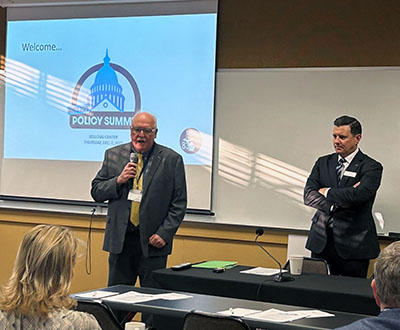
MAC President Jim Storey welcomes the in-person and virtual audiences for the 2023 Policy Summit on Dec. 7, as Executive Director Stephan Currie looks on.
Counties have an excellent opportunity to drive policy change in Lansing in coming months, if their leaders work with MAC at every opportunity, Board President Jim Storey of Allegan County told the nearly 100 attendees of the MAC Policy Summit on Dec. 7.
Storey’s remarks opened the one-day event at the Kellogg Center, which included presentations on:
The expected effects of the recently approved juvenile justice reform package, most notably the shift to a 75 percent reimbursement rate for community-based services for counties.
The politics and implications over the upcoming debate for a statewide septic code: Presenters explained there is a consensus among stakeholders — including local health departments and septic industry experts — that reform is needed. They added, though, that the final product will not look like the legislation that was introduced in Lansing this year.
National efforts to change federal law so that counties are not left with the health bills of jail inmates who have not yet been charged with a crime. Blaire Bryant of the National Association of Counties noted that county efforts were gaining traction on Capitol Hill to reform the Medicaid Inmate Exclusion Policy.
The continuing work of a MAC-commissioned study on the services that each county provides to the local governments within its borders.
“We are thrilled by the turnout for the event — and by the extended Q&A segments in the sessions,” said Executive Director Stephan Currie. “I think the results speak to the quality of the presentations and to the eagerness of our members to stay current on policy questions so they can protect their constituents’ interests.”
Look for resources from the summit to post to MAC’s website by the middle of December.
NACo offers update on State and Local Fiscal Recovery Funds’ Obligation Interim Final Rule
 The U.S. Department of Treasury released a new interim final rule to address questions regarding the definition of “obligation” and to provide guidance and clarification for Obligation Interim Final Rule (IFR).
The U.S. Department of Treasury released a new interim final rule to address questions regarding the definition of “obligation” and to provide guidance and clarification for Obligation Interim Final Rule (IFR).
Treasury defined “obligation” as “an order placed for property and services and entering into contracts, subawards, and similar transactions that require payment.”
State and Local Fiscal Recovery Funds (SLFRF) must be obligated by Dec. 31, 2024, funds for Title I and Surface Transportation projects must be expended, by Sept. 30, 2024, and funds for most eligible uses must be expended by Dec. 31, 2026. SLFRF funds may only be used to cover costs incurred by Dec. 31, 2024. A recipient may use SLFRF funds to cover the costs of meeting the following: Reporting and compliance requirements, single audit costs, record retention and internal control requirements, property standards, environmental compliance requirements, and civil rights and nondiscrimination requirements.
Under the Obligation IFR, the definition of obligation is unchanged, but a recipient is also considered to have incurred an obligation by Dec. 31, 2024, when recipients incur costs related to the legal and administrative requirements of the SLFRF award funds. Recipient appropriation, budget, or allocation processes would not provide a standard that could be applied consistently across recipients related to the definition of obligation. Recipients can continue to charge indirect cost rates to SLFRF throughout the period of performance.
See relevant “case studies” from Treasury.
“The IFR was submitted for publication on Nov. 9, 2023, and will become effective when published. That will also begin the 30-day comment period. You may submit comments electronically through the Federal eRulemaking Portal: http://www.regulations.gov. All comments should be captioned “Coronavirus State and Local Fiscal Recovery Funds Obligation Interim Final Rule Comment.” Please also include your:
- Name
- Organization affiliation
- Address
- Email address
- Telephone number
Comments received will be posted on http://www.regulations.gov, without change, including any business or personal information provided. Comments received, including attachments and other supporting materials, will be part of the public record and subject to public disclosure. Do not enclose any information in your comment or supporting materials that you consider confidential or inappropriate for public disclosure.
 Staff picks
Staff picks
- Want to attract Gen Z workers? Up your marketing game. (RouteFifty)
- Counties brief Capitol Hill staff on housing affordability (NACo News)
- State-by-State Property Tax At-a-Glance Report (Lincoln Institute of Land Policy)
- Penguin parents sleep for just a few seconds at a time to guard newborns, study shows (Associated Press)
Podcast 83 begins look back at 2023 legislative year
 Legislative successes on juvenile justice reform, property tax reimbursements and revenue sharing highlight the first of two episodes of Podcast 83 that are looking back at 2023 in the State Capitol.
Legislative successes on juvenile justice reform, property tax reimbursements and revenue sharing highlight the first of two episodes of Podcast 83 that are looking back at 2023 in the State Capitol.
Host Stephan Currie and the MAC governmental affairs team of Deena Bosworth, Madeline Fata and Samantha Gibson reviewed the county perspective on the following:
Passage of a huge juvenile justice reform package, which notably did not include an extension of juvenile services under the Michigan Indigent Defense Commission. “MIDC will remain exactly as is,” Gibson said.
Release of Personal Property Tax (PPT) funds for local governments, which are losing revenue due to expanded tax exemptions for small businesses approved by the state two years ago. “There’s been $75 million set aside, and they are required to set aside $75 million each year to go out to local units to reimburse them,” Bosworth explained. “We are pretty happy about that.”
A new, dedicated Revenue Sharing Trust Fund, which was approved overwhelmingly by the House and now awaits action in the Senate in 2024. “It’s a true sharing of the state’s revenue,” Bosworth said of the long-standing MAC priority. “It’s a straight carve-out of the sales tax … and allows for growth.”
View the full video of the episode, recorded on Nov. 28, by clicking here.
The Legislative Year in Review will continue with Part II, set to be released on Wednesday, Dec. 6.
Previous episodes can be seen at MAC’s YouTube Channel.
And you always can find details about Podcast 83 on the MAC website.
 Check out new estimates on opioid settlement payments
Check out new estimates on opioid settlement payments
An Opioid Settlement Payment Estimator was released this week by Attorney General Dana Nessel’s office.
The worksheet outlines the estimated totals for opioid settlements in counties, other local governments and the state. Outside of estimated total amounts by settlement, local governments can see estimates for payments expected from each settlement in each calendar year.
The updated dollar amounts provided in the worksheet also have been updated on MAC’s Opioid Settlement Resource Center dashboard and a link to the payment estimator is provided.
For information on MAC’s opioid settlement resources, contact Amy Dolinky at dolinky@micounties.org.
State offers Dec.15 webinar about new juvenile justice laws
 The Michigan State Court Administrative Office and the Michigan Department of Health and Human Services invite county officials to join an informational webinar to learn more about the recently passed Justice for Kids and Communities bill package. The bill package is the result of the work of the Michigan Task Force on Juvenile Justice Reform and will bring significant changes to the juvenile justice system that will improve outcomes for youth and families and strengthen public safety across the state.
The Michigan State Court Administrative Office and the Michigan Department of Health and Human Services invite county officials to join an informational webinar to learn more about the recently passed Justice for Kids and Communities bill package. The bill package is the result of the work of the Michigan Task Force on Juvenile Justice Reform and will bring significant changes to the juvenile justice system that will improve outcomes for youth and families and strengthen public safety across the state.
MAC supported this package during the 2023 legislative sessions.
The webinar will provide a detailed overview of the legislation. We will also be collecting your outstanding questions about the provisions for review and discussion at a future training opportunity. Please find logistical information to join the webinar below:
- Date: Dec. 15
- Time: 11 a.m. to 12 p.m. EDT
- Zoom link: https://csg-org.zoom.us/j/81923655146?pwd=YWlmUEFpbXp3UXpCU3JvRDFKLzcvZz09
- Meeting ID: 819 2365 5146
- Passcode: 551429
For more information on MAC’s advocacy work on juvenile justice issues, contact Samantha Gibson at gibson@micounties.org.

MAC president ‘visits’ Capitol Hill:
A friend of MAC recently visited the Capitol Hill offices of Congressman John James of Michigan and noticed President Jim Storey also “there” via the cover of the October 2023 edition of Michigan Counties. MAC distributes more than 1,500 printed copies of the magazine every two months to county, state and federal officials.
Three Midland County employees finish NACo leadership program
 MAC congratulates the August 2023 NACo Leadership Academy graduates from Michigan. They join more than 10,000 graduates and current participants from across the country benefitting from the 12-week online program enabling existing and emerging county leaders to achieve their highest potential:
MAC congratulates the August 2023 NACo Leadership Academy graduates from Michigan. They join more than 10,000 graduates and current participants from across the country benefitting from the 12-week online program enabling existing and emerging county leaders to achieve their highest potential:
- Chris Gaumer, equalization director, Midland County
- Jessica Gilkins, board administrative assistant, Midland County
- Marisa Boulton, community corrections coordinator, Midland County
Celebrate the 10th anniversary of the High Performance Leadership Academy with a special training deal: each county can enroll 10 leaders for $15,000 in 2024. Our next cohort starts Jan. 8.
CLICK HERE TO LEARN MORE AND ENROLL
Developed by General Colin Powell, the Professional Development Academy and NACo, the High Performance Leadership Academy is an online 12-week program that helps your workforce develop fundamental, practical leadership skills to deliver results for counties and residents.
St aff picks
aff picks
- “Pup-ular” Dog Names & Breeds of 2023 (Ottawa County)
- 2022 Average Property Tax Rate by County (Michigan Department of Treasury)
- Feral goldfish are menacing Great Lakes: We’re going to need a bigger bowl (Bridge Michigan)
- EGLE invites public input on implementing MI Healthy Climate Plan (Michigan Department of Environment, Great Lakes and Energy)






